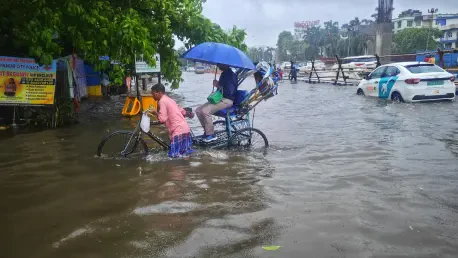In the face of climate change, cities worldwide are becoming increasingly vulnerable, with Lagos experiencing heightened risks such as severe flooding. An innovative insurance approach has emerged to tackle these challenges, specifically parametric flood insurance aimed at bolstering Lagos against economic and environmental threats. The analysis explores its transformative role in risk management and climate resilience, assessing collaborative frameworks and technological advancements through public and private partnerships.
Navigating Economic Vulnerability with Insurance
Flood management in Nigeria has traditionally relied on reactive measures with scant planning, putting communities at risk. However, growing climate change impacts have shifted focus to proactive risk mitigation. This trend is reflected in the emergence of financial instruments like parametric insurance, marking a significant departure from conventional models. By aligning with global sustainable urban planning trends, Lagos can enhance its resilience significantly, making parametric insurance vital to long-term climate adaptation strategies.
Embracing Technology for Effective Response
Parametric insurance, grounded in satellite flood footprint data, offers real-time financial protection. Triggering coverage based on predetermined data points, it provides Lagos with essential funds for disaster response. Cooperation between government and insurance entities, such as AXA Mansard and international organizations like IDF, demonstrates innovative collaboration. Although obstacles like regulation and budgeting exist, the fiscal resilience and quick recovery potential are invaluable assets.
Evaluating Efficiency and Flexibility
When deployed, parametric solutions offer immediate liquidity essential for disaster relief, overshadowing traditional insurance schemes that involve long claim processes. Concerns about data precision, premium affordability, and equitable fund distribution remain critical, yet emerging trends aim to enhance methodologies and transparency for effective response in affected populations.
Regional Adaptations and Sector Challenges
Lagos faces challenges of dense population and infrastructure limitations that affect insurance efficacy. Industry viewpoints advocate for locally tailored methods and governmental engagement for success. Additionally, misconceptions about insurance can impede broader acceptance, warranting effective communication and educational outreach. An integrated approach, respecting local nuances, can fortify climate defenses, safeguarding vulnerable communities.
Emerging Trends Redefining Risk Management
Technological advances in satellite accuracy and predictive analytics promise to enhance parametric model precision, significantly influencing risk insurance. Economically, climate bonds offer alternative avenues for premium support, while evolving regulatory frameworks are poised to streamline private and governmental collaborations. Experts view these insurance systems as becoming integral to national climate strategies, bolstering resilience on broader scales.
Implementing Strategic Solutions for Resilience
Lagos municipalities and stakeholders should prioritize strategies that incorporate parametric insurance in fiscal planning, enhancing data collection, and fostering community engagement. Establishing frameworks aligned with both international climate goals and local socio-economic contexts is crucial. Insurance sector professionals can facilitate adaptation with policy innovations and partnerships that champion local ownership.
Reflecting on Climate Risk Adaptation
Incorporating parametric insurance in Lagos underscores its significance in climate resilience, aligning with adaptive city planning to offer immediate financial relief and bolster sustainability goals. As municipalities globally strive to protect vulnerable populations, they consider proactive insurance solutions as integral components of their climate risk management strategies, shaping robust responses to ongoing climate challenges.









